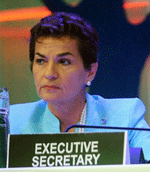Statement by the Third World Network at the AWGLCA informal group on legal options, 6 October 2011, Panama City
Published on Tue, 2011-10-11 07:54
The Third World Network (TWN, point focal of Social Watch), “do not support any outcome” of the negotiations on climate change “that undermines or terminates the Kyoto Protocol, or that enshrines a weaker system than the Kyoto Protocol in international law,” according to the statement the group published on the occasion of the Ad Hoc Working Group on Long-term Cooperative Action under the Convention on Climate Change (AWG-LCA), held last week in Panama City. “A bottom-up domestic pledge and review system represents just such a weak, deregulated system. And the negotiations certainly seem to be headed in that direction,” adds the statement, launched at the third part of the sixteenth session of the Ad Hoc Working Group on Further Commitments for Annex I Parties under the Kyoto Protocol (AWG-KP 16) and the third part of the fourteenth session of the AWG-LCA 14. Jennifer Haverkamp, the international climate program director at the US-based Environmental Defense Fund, said to AFP news agency that "countries are trying pretty hard to scale expectations down to a realistic level for Durban," where the next Conference of the Parties (CoP) of the Convention, that will take place in Durban, South Africa, starting Nov. 28. Participants in the Panama meeting “have long billed the conference opening in Durban as a last chance to find a way forward on fighting climate change, with the Kyoto Protocol's commitments to cut carbon emissions expiring after 2012,” explained AFP’s journalist Shaun Tandon. According to TWN, “developed countries say that a new comprehensive treaty is necessary as the Kyoto Protocol only covers 27% of global emissions. But this was exactly why in Bali, a three-pronged approach was agreed to by all Parties, to deal with 100% of emissions from all countries”. The Bali agreement included that the Kyoto Protocol parties would undertake emission reduction commitments under a second commitment period, that the United States would undertake emission reduction commitments or actions in a comparable manner under the Convention, and that developing countries would undertake “nationally appropriate mitigation actions” NAMAs under the Convention, enabled and supported by technology, finance and capacity building. “That was only 4 years ago, but the goalposts are already being shifted,” evaluated TWN. The Secretary of the UNFCCC, Cristina Figueres, said that one solution would be for some economies to recommit under Kyoto "to uphold the rules-based system," with other nations making pledges that are "rigorous" but outside the treaty, according to AFP. "Governments are exploring precisely those middle-ground solutions. That is going to be the crux of Durban." TWN remembered that “a number of detailed studies have clearly demonstrated that developing country pledges amount to more mitigation than developed country pledges. So, the problem lies not with developing countries, and yet attempts are being made to shift the burden from developed to developing countries through a new treaty. The mandate of these negotiations is to implement the Convention, not to renegotiate it.” “In this respect — adds the statement —, we also do not support agreeing upfront to a legally binding mitigation treaty that will sit alongside the Kyoto Protocol (the so-called two protocol approach), as it is likely to have the same effect of terminating the Kyoto Protocol, by legally superseding it,” added the organization. Attempts to re-negotiate the Convention “are likely to lead to much further delays and risks the collapse of the system,” said TWN. “Categorizing countries as ‘major emitters’ fails to take into account a fair and principled burden sharing approach with includes historical responsibility and per capita emissions.” This information is based on data from the following sources: |
SUSCRIBE TO OUR NEWSLETTER



